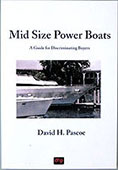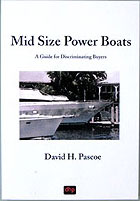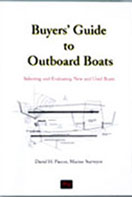All about
Pre-Purchase Surveys
by David Pascoe
Note: We no longer offer surveys. This article is only to give you general information about pre-purhase surveys.
This page provides general information about our surveys, the services we offer, and other important information you need to know.
- What is a Pre Purchase Survey?
- About Surveyors
- Client Input
- The Three Parts of the Survey
- The Sea Trial
- About the Engines
- Compression Testing
- Oil Analysiss
- Scheduling
- Who Pays What
- By Owner Sales
- How Long Does It Take?
- Survey Conditions
- Reports
- Appraisals
- Other Considerations
- When Boats Don't Survey Out So Well
What is a Pre Purchase Survey?
The purpose of obtaining a pre purchase survey on a boat is to gain as much information on the condition of the boat as possible before you buy it. What the surveyor does, and how he does it has a lot to do with his skill, experience, and personal methods of work. The amount of information that can be obtained is dependent on a variety of factors. These range from the boat itself, to how much you are willing to pay to get that information.
The most common question a surveyor is asked by someone who has never experienced the survey process is, "What do you do?" This is not an easy thing to answer for a process that basically takes a entire day to accomplish. To put it as succinctly as possible, the primary work of the surveyor is observation and testing. The two most important tools that a surveyor possesses do not consist of a box of fancy digital instruments, but his experience and his skills in observation. Needless to say, the better educated, the more experienced, more careful a surveyor is, the higher the caliber of his work.
To make a long story short, the survey involves examining every aspect of the boat possible without taking it apart, and includes testing of all major systems. The process naturally focuses on the most important -- read most expensive -- aspects first. We are far less concerned whether coffee makers and stereo systems work, than the more important aspects such as major machinery and hull construction.
About Surveyors
You should be aware that not all areas of the nation support full time surveyors simply because there aren't enough boats there to do so. The same applies to specialized diesel engine surveyors. Many areas will only support part time surveyors, and because of this, survey procedures are not standardized nationally.
Major boating centers like Florida, California and some areas of the Atlantic coast are capable of supporting professional full time marine surveyors, so that the marine survey procedures are more or less the same.
In Florida, the largest boating center in the world, the survey process is standardized to a considerable degree. What the survey costs, and what it entails, is basically derived from what the average buyer wants to know, and what he is willing to pay for. Understand that the thoroughness of a survey is variable. One client may say that he just wants "the basics" and will tolerate a wide range of defects, while another is looking for a 'perfect" boat and wants to know about every nick, scratch and stain. Buyers often establish their own requirements, and they are well within their rights in doing so. Naturally, if the customer wants more, the surveyor is going to charge more. Yet the standard survey is based on what surveyors believe the average boat buyer both needs and wants to know.
Client Input
The more the surveyor knows about your boating experience and your specific requirements, the better able he will be to serve your interest. When you call us for a survey and ask, "How much does it cost?" by way of an answer you'll get a barrage of questions. Not only do we need to know about the boat you're interested in, but we want to know something about you, your experience and your requirements. If you are a novice, chances are you don't really know what you want, so this will be our way of helping you to determine what your requirements are. The more information you can give us, the better able we be to serve you. There are endless varieties of boats, and endless levels of expectations that boat buyers have. We do our best to tailor the service we offer to fit your specific needs.
The following is a brief description of the basics:
The Three Parts of the Survey
Surveys consist of three distinct aspects:
1) the static, in water inspection,
2) the haul out to inspect the underbody, and
3) the sea trial.
No survey is complete without performing these three aspects. The sea trial involves not only performance testing the vessel and its engines, but is also the time when many major systems are checked out. In addition to this, the surveyor will also check out the internal hull structures to make sure that all is as it should be.
The Sea Trial
On the sea trial, not only is the engine and overall vessel performance evaluated, but we test the steering, controls, shafting, engine mounts and exhaust systems, but we also examine structural hull elements while under load. On sail boats, the overall sailing systems are tested and evaluated for condition and proper tuning. There are a lot of things that need to be looked at in a short period of time. Therefore, at the very minimum, we recommend that an open water sea trial be carried out for at least one hour's duration, but longer for larger yachts. Short runs in restricted waterways will not accomplish this objective. This is one of the "logistics" questions that needs to be answered when making arrangements for the survey.
We recommend open ocean trial runs whenever possible. However, when sea conditions are rough, we have to defer to the seller's discretion because of the liability risks that would be raised if we insist on going out in rough water.
About Engines
Many people ask, "Do you survey the engines too?" The answer to this is yes and no. Let me explain. When it comes to diesel powered vessels, diesel engines are more complex and the vessels usually larger. Most surveyors do not perform diesel engine surveys for several reasons. First, there is not enough time in one day to do both the hull and machinery. For reasons of economy, most surveys on yachts up to 55-60 feet are accomplished in one day. Therefore, it is highly recommended that an independent diesel surveyor be engaged for full diesel surveys.
We will performance test and visually inspect small diesels or single engine boats in cases where the engines are fairly new. But for older and larger engines, a full diesel engine survey is highly recommended. Yes, the cost is substantial, but so are repair costs. Repair costs on diesels typically run 4 times that of gas engines. After looking at the engines, we may advise you that an engine survey is necessary.
Some diesels are more amenable to survey than others. Detroit Diesels, if we may use such a term, are the most surveyable. That's because there are inspection ports that allow the surveyor to actually look inside some of the cylinders. Small Cummins and Caterpillar engines (like the 3208) are reasonably surveyable. There is quite little than can be done for most sailboat auxiliaries and a number of small, inline 6 diesels, at least at reasonable cost. We recommend that ALL high performance diesels get a full diesel survey.
On gas engines, we will perform rudimentary engine surveys. What this means is that not only do we performance test the engines, but will perform a complete visual inspection. While this may not seem like much, an expert can learn a lot just by observing the condition. Much will depend on the size, age and condition of the boat, and how much time the surveyor will have available.
Compression Testing
We will occasionally perform compression tests on gas engines at modest extra charge. Compression testing is a very valuable diagnostic tool, particularly on engines 4 years or older. We recommend that all salt water cooled gas engines be so tested. But bear in mind that the ability to perform compression tests depends on a variety of factors, such as the ability to reach and get the spark plugs out. Plus we have to deal with gasoline and the dangers of explosions. Therefore, we will be unable to advise you whether we can perform a compression test until we have actually seen the vessel. Compression testing of outboard motors is not a problem and we can do this in most any case.
Oil Analysis
This is
not quite as valuable a diagnostic tool as many people have been lead
to believe. To do an analysis of wear metals, one first needs to know
how long the engine oil has been in service, but this is something we
almost never know. The main benefits of oil analysis is that it can
determine if there is salt, water or antifreeze in the oil. As a tool
for determining internal wear, it is basically only useful when conditions
of extreme wear are present. Very often, we get no indication of what
it is that is wearing excessively. After the samples are obtained, they
then have to be sent to a lab service. It usually takes 3 days before
obtaining the results.
We service boat buyers directly. We do NOT solicit yacht brokers for business and therefore do not have conflicts of interest of who we have allegiance to. We serve only you, the boat buyer.
Scheduling
It's not a good idea to book a survey more than two weeks in advance unless there are unique circumstances. Most surveys planned far in advance fall through because circumstances change and people change their minds. Our scheduling is highly variable and unpredictable. Schedule the survey only after you have an accepted, signed offer. In most cases we can accommodate you on a few days notice. Note that it is always a good idea when signing a purchase agreement to allow your self at least two weeks after the signing to complete the survey and closing. Don't allow yourself to be rushed into a closing.
Who Pays What
The buyer is responsible for the survey fee and the hauling charges. The seller is responsible for the cost of someone to operate the vessel such as a paid captain, as well as insuring that it has adequate fuel. A boat with a very dirty bottom needs to be cleaned. Establish with the seller who is going to pay this cost. NOTE: Haul out fees must be paid at the time of hauling.
By Owner Sales
Normally it is the job of the broker to set up the survey arrangements will the seller and insure that the vessel is made available with someone to operate it, be it a seller or a paid captain. This is part of what the broker's commission involves. When there is no broker involved, sellers may not be aware of what is expected of them and therefore it is up to you to make sure all the necessary requirements are met. This is the service you are not paying for when there is no broker involved. Note that the surveyor will NOT be able to do this for you since he spends his time out on boats and is not available to do this kind of telephone work. Please advise the seller that he must NOT start and run the engines before the surveyor arrives. See Survey Conditions below.
Normally we will try to make a courtesy call to the seller just to be sure everything is in order.
How Long Does It Take?
We schedule an entire day for the survey, even if it is a 24 footer. Small boats are not necessarily easier to survey than larger ones. The same logistics are involved so that small boat surveys do not necessarily take less time. The fact is, we don't know how long the survey will take. The time involved is more a factor of the condition of the boat than anything else.
Survey Conditions
It is important that you understand that the quality of the survey can only be as good as the conditions under which it is conducted. The surveyor isn't going to be able to do a very good job if there are a lot of people on board, if the seller limits the amount of time the vessel is available, or a host of other negative circumstances. The surveyor has to conduct his work in an orderly fashion, meaning that there is a certain order of events that has to take place.
1.The surveyor cannot work in an engine room where the engines have been run and the temperature is 125 degrees. It's already hot enough in Florida without adding engine heat to the mix. Therefore, the surveyor will need at least TWO HOURS with the vessel BEFORE the engines are run and the vessel is moved from the dock.
2. We recommend that haul outs and sea trials NEVER be scheduled before 12:00 noon. Please note that if a broker or seller tells us "the yard can only haul the boat at 9:00 AM because of the tide" we will probably refuse to do the survey. If the sellers cannot meet our requirements for scheduling, we will be unable to perform the survey because we cannot work around hot machinery. It is simply not possible to do a good job under these circumstances.
3. We routinely perform our surveys in conjunction and concurrently with engine surveyors. Both the engine and hull surveys can and should be scheduled concurrently. This is not a problem.
4. It is EXTREMELY IMPORTANT to limit the number of persons onboard the vessel during the survey. While we encourage YOU to attend the survey, please DO NOT invite your friends and family to go along. Between the brokers, surveyors, you and the seller or captain, there will already be too many people on board. Moreover, it is necessary that the vessel be operated with all the hatches open, creating dangerous conditions that pose injury and liability hazards that we'd prefer to avoid.
5. Logistics In the Palm Beach and Broward county areas, we don't have any serious logistic problems that interfere with the survey process. A logistic problem means something like having to travel two hours to get to a boat yard for hauling. Obviously, the surveyor is going to have trouble doing his job on a boat that is underway all that time. Other logistic problems involve things like taking a boat to a yard and then leaving it there, not returning to the place where we started out. Outside of our normal service area, these logistical problems need to be considered in advance before scheduling.
6. Problems occasionally arise with older vessels that are not really ready for survey. Such things as engine breakdowns, dead batteries and a host of other problems may prevent the survey from being completed as expected. Many times the seller will try to rush in a repairer to get the problem corrected while the surveyor is trying to do the survey. This obviously creates problems for everyone, not the least of which is the surveyor trying to do his job in the midst of a repair project. In many cases the survey is going to be delayed, in which case an additional charge will be made.
7. We often run into problems where no power, or inadequate shore power is available to test systems. This is very common with boats docked at private residences. In some cases, the best we can do is to test AC systems on generator power only.
8. Live Aboards, Stores & Provisions We will not perform surveys on live aboard sailboats or other small vessels such as trawlers. The reason is that these boats usually have such a huge quantity of personal gear on board that it is not possible to carry out a satisfactory survey. Occasionally we run across other boats that are so loaded up with gear that this condition greatly impairs the survey process. We are not in the position of being able to load and unload equipment from storage compartments. The survey report will reflect that such compartments are loaded and could not be inspected. You should be alert to this possibility when you go to make your first inspection of the boat. A heavily loaded yacht is basically not amenable to being surveyed.
Reports
We often have difficulty in conveying the point that the surveyor is not finished until his report is written. Our goal is to provide with the very best service possible, but it is important that you understand that surveying is very demanding physical work, particularly when he is working in 95 degree heat and high humidity. When he is finished with the job, he's obviously not going to be in a fresh state of mind. Naturally, the client wants a full report as soon as the physical survey is completed. However, please understand that the surveyor's work is really not finished yet.
The reason
his work isn't finished is because he needs some time to digest his
findings just like you will. He needs some time to think about it, and
maybe do a little research as well. While we will be happy to give you
a verbal rundown on our findings, we strongly urge you not to allow
yourself to be rushed into a closing based on a verbal report. This
is a common tactic of brokers to rush the closing before "buyer's
remorse" sets in. Only the written report constitutes the full
and complete results of the survey. Be aware that anything the surveyor
tells you verbally during the survey is subject to change. We urge you
not to close a sale until you have received and read the final report.
Appraisals
The marine surveyor is not the best person to make appraisals of market value. Bear in mind that a surveyor is a generalist, a general practitioner, but there are tens of thousands of different model boats out there of all type, sizes and shapes. The surveyor isn't even familiar with 5% of them, nor could he be. To accurately appraise the market value of a boat requires some time consuming research of the market itself. This is not part of the survey process. Surveyors put appraised values on survey reports mainly due to the demands of banks and insurance companies. These values are intended to be reasonably accurate, but not precise, since they do not include a complete market survey.
As far as "book values" go, just ask yourself how the book makers obtained those numbers, and that will pretty much answer this question. There is no such thing as a wholesale market in boats, as there is with cars.
Other Considerations
The standard survey is just that, a SURVEY. A survey does not mean a technical ANALYSIS of the vessel and all its systems. Basically we determine whether structures appear to be sound and systems are operating properly. When problems are located, the one thing we cannot do is to analyze what precisely is wrong, or what is necessary to repair the problem. This is a function of analysis, not survey.
When we provide a list of defects, the most common question asked is, "How much does it cost to fix all this?" When you ask the surveyor that question, please consider what kind of answer you would get if you asked the very same question of a repair facility. Would you get an immediate answer? No, they'd probably have to take the faulty things apart and analyze what was needed to repair the item. Well, the surveyor is no different. He doesn't know any more than a repairer would. It's his job to find the problems, but not to make estimates of repair. If he does give you an answer, it won't be anything more than a guess.
When Boats Don't Survey Out So Well
It is often the case that older boats have a lot of deferred maintenance or faulty conditions. The surveyor is legally obligated to include all such conditions in his written report. This is particularly true for buyers who are buying boats intended as restoration projects. You should anticipate that this is going to cause problems when finance and insurance is involved. The lender may not want to lend and the insurer not to insure. Consider these points before you make the deal and invest money in a survey.
If you are buying a boat that is run down and in need a great deal of work, you should expect that you will have to make the boat sea worthy before you can get insurance. That means correcting any fault that threatens to cause an accident or loss. At best, you may be able to obtain a "port risk" insurance, which not allow you to move the boat from a dock or yard until it can pass survey.
You will then be required to get a second survey, an insurance condition and valuation survey (C&V) which is a much shorter process, and at lesser cost, to prove that all faults have been corrected.

















David Pascoe is a second generation marine surveyor in his family who began his surveying career at age 16 as an apprentice in 1965 as the era of wooden boats was drawing to a close.
Certified by the National Association of Marine Surveyors in 1972, he has conducted over 5,000 pre purchase surveys in addition to having conducted hundreds of boating accident investigations, including fires, sinkings, hull failures and machinery failure analysis.
Over forty years of knowledge and experience are brought to bear in following books. David Pascoe is the author of:
In addition to readers in the United States, boaters and boat industry professionals worldwide from nearly 80 countries have purchased David Pascoe's books, since introduction of his first book in 2001.
In 2012, David Pascoe has retired from marine surveying business at age 65.
On November 23rd, 2018, David Pascoe has passed away at age 71.
Biography - Long version